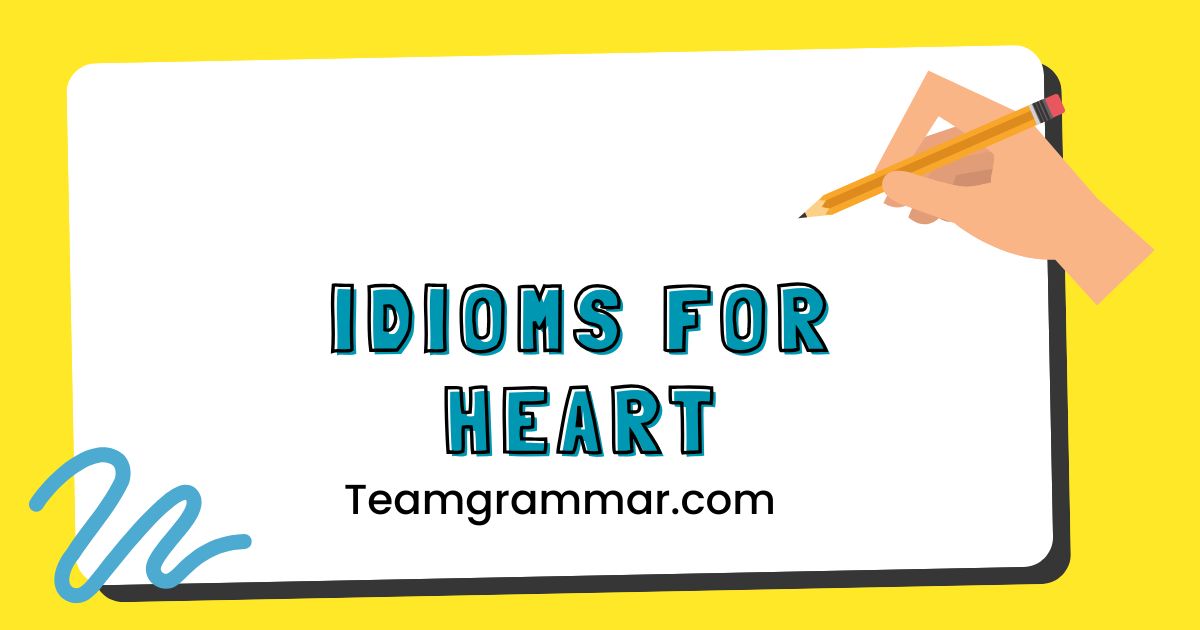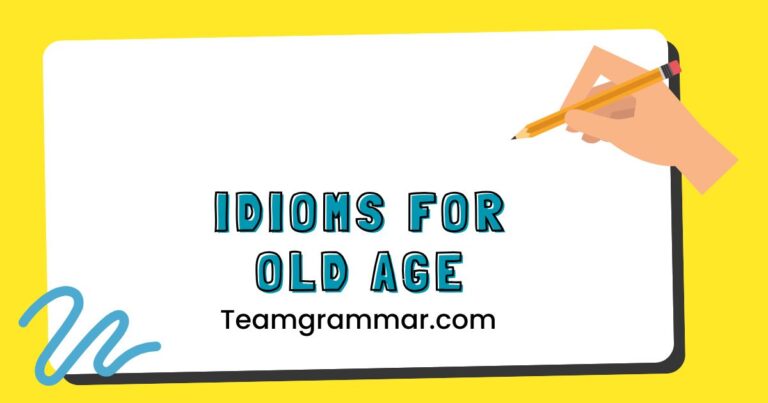41 Heartfelt Language: Mastering Idioms About the Heart
Idioms are a fascinating aspect of the English language, adding color and depth to our conversations and writing. Understanding idioms related to the “heart” is particularly valuable because these expressions often convey strong emotions and deeply personal experiences.
This article provides a comprehensive guide to heart-related idioms, exploring their meanings, origins, and usage. Whether you’re an English language learner or a native speaker looking to refine your vocabulary, this guide will help you master these expressive phrases and use them effectively in various contexts.
Table of Contents
- Introduction
- What are Idioms?
- Structural Breakdown of Heart Idioms
- Types and Categories of Heart Idioms
- Examples of Heart Idioms
- Usage Rules for Heart Idioms
- Common Mistakes with Heart Idioms
- Practice Exercises
- Advanced Topics in Heart Idioms
- Frequently Asked Questions
- Conclusion
What are Idioms?
Idioms are expressions whose meanings cannot be understood from the literal meanings of the individual words. Instead, they function as a unit, conveying a specific concept or idea.
Idioms are culture-specific and often deeply rooted in the history and traditions of a language. They add richness and nuance to communication, but can be challenging for non-native speakers to grasp.
Heart idioms, in particular, revolve around the metaphorical use of the “heart” to represent emotions, feelings, courage, and inner strength. The heart, long considered the center of emotion and vitality, serves as a powerful symbol in these expressions.
Understanding heart idioms requires recognizing the symbolic significance of the heart within the English language and culture.
Structural Breakdown of Heart Idioms
Heart idioms vary in their structural complexity. Some are simple phrases consisting of a few words, while others are more elaborate clauses or sentences.
They can include verbs, nouns, adjectives, and adverbs, all working together to create a figurative meaning. Analyzing the structure of heart idioms can help in understanding their usage and meaning.
Many heart idioms follow common grammatical patterns, such as subject-verb-object or prepositional phrases. For example, “to have a change of heart” follows a subject-verb-object structure, where “have” is the verb, and “a change of heart” is the object.
Recognizing these patterns can aid in identifying and interpreting new idioms as you encounter them.
Types and Categories of Heart Idioms
Heart idioms can be categorized based on the emotions, experiences, or concepts they represent. Here are some common categories:
Idioms Related to Love and Affection
These idioms describe feelings of love, attraction, and deep affection. They often involve expressions of passion, devotion, and emotional connection.
Idioms Related to Emotion and Feeling
This category includes idioms that express a wide range of emotions, such as joy, sadness, anger, and fear. They often depict the intensity and impact of these feelings on the individual.
Idioms Related to Courage and Determination
These idioms focus on the heart as a symbol of bravery, resilience, and inner strength. They often describe acts of courage, perseverance, and overcoming challenges.
Idioms Related to Sympathy and Compassion
This category includes idioms that express empathy, understanding, and concern for others. They often involve acts of kindness, support, and emotional connection.
Idioms Related to Heart Health and Wellbeing
While less common, some idioms relate to the physical heart and its connection to overall health and wellbeing. These idioms often serve as warnings or reminders about the importance of self-care.
Examples of Heart Idioms
The following sections provide comprehensive examples of heart idioms, categorized by their thematic focus. Each table includes at least 20 examples, illustrating the diverse range of meanings and contexts in which these idioms are used.
Idioms Related to Love and Affection
This table provides examples of idioms that express feelings of love, attraction, and deep affection. They often involve expressions of passion, devotion, and emotional connection.
| Idiom | Meaning | Example Sentence |
|---|---|---|
| Heartthrob | A celebrity or other public figure who is very attractive. | The actor became a teen heartthrob after his role in the popular movie. |
| Wear your heart on your sleeve | To make your feelings obvious. | He wears his heart on his sleeve, so everyone knows when he’s upset. |
| Have a soft spot for | To feel affection for someone or something. | She has a soft spot for stray animals and often brings them home. |
| Win someone’s heart | To gain someone’s love or affection. | He tried to win her heart with flowers and romantic gestures. |
| From the bottom of my heart | With sincere and deep feelings. | I thank you from the bottom of my heart for your support. |
| Heart’s desire | Something that one greatly wants. | Traveling the world is her heart’s desire. |
| Close to one’s heart | Important or cherished. | The charity work is very close to her heart. |
| Pour your heart out | To express your feelings openly and honestly. | She poured her heart out to her best friend about her problems. |
| Young at heart | Having a youthful spirit and attitude, regardless of age. | Even though he’s 80, he’s still young at heart. |
| A change of heart | To change one’s opinion or feeling about something. | He had a change of heart and decided to forgive her. |
| Take to heart | To take something seriously or be deeply affected by it. | He took her advice to heart and made some positive changes. |
| Have a heart of gold | To be kind, generous, and compassionate. | She has a heart of gold and is always helping others. |
| Follow your heart | To do what feels right, even if it’s difficult. | She decided to follow her heart and pursue her dream career. |
| Heart skips a beat | To feel a sudden rush of excitement or fear. | My heart skipped a beat when I saw him walk in. |
| To give one’s heart to someone | To fall deeply in love with someone. | She gave her heart to him after their first date. |
| Cross my heart | A promise that something is true (often used by children). | “I promise I won’t tell anyone,” she said, “cross my heart.” |
| Straight from the heart | Sincere and genuine. | His apology was straight from the heart. |
| Steal someone’s heart | To make someone fall in love with you. | He stole her heart with his charm and wit. |
| All heart | Full of kindness and generosity. | He’s all heart, always willing to help those in need. |
| To set one’s heart on something | To strongly desire something. | She set her heart on winning the competition. |
| Heavy heart | Feeling sad or burdened. | She left with a heavy heart. |
| Light-hearted | Carefree and cheerful. | It was a light-hearted comedy. |
Idioms Related to Emotion and Feeling
This table provides examples of idioms that express a wide range of emotions, such as joy, sadness, anger, and fear. They often depict the intensity and impact of these feelings on the individual.
| Idiom | Meaning | Example Sentence |
|---|---|---|
| Heartache | Emotional pain or distress, often caused by loss or disappointment. | She experienced great heartache after the end of her relationship. |
| Sick at heart | Feeling deeply disappointed or upset. | I was sick at heart when I heard the news. |
| A broken heart | The feeling of sadness and grief after the end of a romantic relationship. | She had a broken heart after her boyfriend left her. |
| To have your heart set on something | To want something very much. | He had his heart set on getting a new car. |
| To lose heart | To become discouraged or lose enthusiasm. | Don’t lose heart, you’re doing a great job. |
| To break someone’s heart | To cause someone emotional pain, especially in a romantic relationship. | He didn’t mean to break her heart. |
| To eat your heart out | To feel jealousy or envy. | You can eat your heart out; I’m the one who won. |
| To have a change of heart | To change your opinion about something. | She was going to sell her house, but she had a change of heart. |
| To wear your heart on your sleeve | To show your feelings openly. | He wears his heart on his sleeve, so everyone knows how he feels. |
| To take something to heart | To consider something seriously and be affected by it. | She took his criticism to heart and tried to improve. |
| To find it in your heart | To be able to forgive or show compassion. | Could you find it in your heart to forgive him? |
| To not have the heart to do something | To not be able to do something because it would cause someone pain. | I didn’t have the heart to tell her the bad news. |
| Bleeding heart | Someone who is excessively sympathetic or sentimental. | He was a bleeding heart, always donating to charities. |
| From the heart | Sincere and genuine. | His apology was from the heart. |
| By heart | To memorize. | She know the poem by heart. |
| Have your heart in your mouth | To be very nervous or scared. | I had my heart in my mouth when I was waiting for my test results. |
| Harden your heart | To become less sympathetic or compassionate. | She had to harden her heart after being betrayed. |
| After one’s own heart | Someone who shares similar tastes or feelings. | She is a woman after my own heart. |
| A weight off one’s heart | A relief from worry or stress. | It was a weight off my heart when I heard she was safe. |
| A lump in one’s throat | A feeling of tightness in the throat due to strong emotion. | I had a lump in my throat when I said goodbye. |
| A gut feeling | An intuition. | I had a gut feeling that I should not go there. |
Idioms Related to Courage and Determination
This table includes idioms that focus on the heart as a symbol of bravery, resilience, and inner strength. They often describe acts of courage, perseverance, and overcoming challenges.
| Idiom | Meaning | Example Sentence |
|---|---|---|
| Take heart | To be encouraged; to feel braver. | Take heart, things will get better. |
| Faint of heart | Easily frightened or discouraged. | This movie is not for the faint of heart. |
| Put your heart and soul into something | To dedicate yourself completely to something. | She put her heart and soul into the project. |
| Have the heart of a lion | To be very brave and courageous. | He has the heart of a lion and never gives up. |
| With a heavy heart | Feeling sad or regretful. | I left my job with a heavy heart. |
| At heart | In one’s true nature or feelings. | He seems tough, but at heart he’s a kind person. |
| Do something to your heart’s content | To do something as much as you want. | You can read to your heart’s content in the library. |
| Lose heart | To become discouraged. | Don’t lose heart just because you failed once. |
| From the bottom of your heart | Sincerely and deeply. | I thank you from the bottom of my heart. |
| Not have the heart to do something | To not be able to do something because it would upset someone. | I didn’t have the heart to tell her the truth. |
| Where your heart is | What you are most passionate about. | She knew where her heart was and pursued her dream. |
| Have a change of heart | To change your mind or feelings about something. | He was going to quit, but he had a change of heart. |
| Take heart from something | To find encouragement in something. | We took heart from their success. |
| Speak your heart | To express your feelings openly and honestly. | She decided to speak her heart. |
| Set one’s heart on something | To strongly desire something. | He set his heart on winning the race. |
| After someone’s own heart | Similar to one’s own preferences or desires. | That book is after my own heart. |
| To one’s heart’s content | As much as one desires. | They talked to their heart’s content. |
| Near to one’s heart | Important or cherished. | This cause is very near to my heart. |
| Find it in your heart | To be able to forgive or show compassion. | Can you find it in your heart to forgive him? |
| Cross my heart (and hope to die) | A solemn promise. | I promise I didn’t do it, cross my heart. |
| Have a strong heart | To be resilient. | Having a strong heart is important to overcome life’s challenges. |
Idioms Related to Sympathy and Compassion
This category includes idioms that express empathy, understanding, and concern for others. They often involve acts of kindness, support, and emotional connection.
| Idiom | Meaning | Example Sentence |
|---|---|---|
| Have a heart | To show compassion or sympathy. | Have a heart and give him another chance. |
| A heart of gold | A kind, generous, and compassionate nature. | She has a heart of gold and is always helping others. |
| Bleeding heart | Someone who is excessively sympathetic or sentimental. | He’s a bleeding heart, always donating to charity. |
| With a heavy heart | Feeling sad or regretful, often when expressing sympathy. | With a heavy heart, I must tell you that we can’t help. |
| Find it in your heart | To be able to forgive or show compassion. | Can you find it in your heart to forgive him? |
| Touch someone’s heart | To evoke feelings of sympathy or compassion in someone. | The story touched her heart deeply. |
| Have a soft heart | To be easily moved to sympathy or compassion. | He has a soft heart for animals. |
| Heart goes out to | To feel sympathy for someone. | My heart goes out to all those who lost their homes. |
| Open your heart | To be receptive to new ideas or feelings, often involving compassion. | You need to open your heart to understand others’ suffering. |
| Not have the heart | To lack the courage or compassion to do something unpleasant. | I don’t have the heart to tell her she didn’t get the job. |
| A tender heart | A kind and gentle nature. | She has a tender heart and is always caring for others. |
| A warm heart | A kind and friendly nature. | He has a warm heart and is always welcoming. |
| From the bottom of one’s heart | Sincerely and deeply felt, often when expressing gratitude or sympathy. | I thank you from the bottom of my heart for your kindness. |
| A kind heart | Having a compassionate and generous nature. | She has a kind heart and volunteers at the local shelter. |
| To have a good heart | To be a generally good and compassionate person. | He has a good heart and always tries to do the right thing. |
| A generous heart | Being willing to give and share with others. | She has a generous heart and loves to donate to charity. |
| A compassionate heart | Feeling and showing sympathy and concern for others. | He has a compassionate heart and always helps those in need. |
| A big-hearted person | A generous and kind individual. | She is a big-hearted person who always puts others first. |
| A sympathetic ear | Someone who listens with understanding and compassion. | She is always there with a sympathetic ear. |
| A soft touch | A gentle and compassionate approach. | She has a soft touch when dealing with difficult situations. |
| Hollow heart | Someone without sympathy. | The villain was a man with a hollow heart. |
Idioms Related to Heart Health and Wellbeing
While less common, some idioms relate to the physical heart and its connection to overall health and wellbeing. These idioms often serve as warnings or reminders about the importance of self-care.
| Idiom | Meaning | Example Sentence |
|---|---|---|
| Heart attack | A sudden and serious medical emergency. | He suffered a heart attack and was rushed to the hospital. |
| Heart condition | A medical problem affecting the heart. | She has a heart condition and needs to take medication. |
| Heart disease | A range of diseases affecting the heart. | Heart disease can be prevented with a healthy lifestyle. |
| By heart | To memorize something perfectly. (Indirectly related to wellbeing as it demonstrates mental exercise) | She knows the poem by heart. |
| A change of heart | Changing one’s mind. (Indirectly related to wellbeing as it can reduce stress from a bad decision) | He had a change of heart and decided to stay. |
| Heart rate | The speed at which the heart beats. | His heart rate increased during the exercise. |
| Healthy heart | A heart that is functioning properly and free from disease. | Regular exercise is important for maintaining a healthy heart. |
| Open-heart surgery | A surgical procedure performed on the heart. | He underwent open-heart surgery to repair a valve. |
| With all your heart | With all your energy and enthusiasm. | She played the piano with all her heart. |
| To give one’s heart to something | To dedicate oneself fully to a cause or activity. | He gave his heart to volunteering at the hospital. |
| Heart murmur | An unusual sound heard during a heartbeat. | The doctor detected a slight heart murmur during the examination. |
| Heart failure | A condition in which the heart cannot pump enough blood to meet the body’s needs. | He was diagnosed with heart failure and had to adjust his lifestyle. |
| Heart transplant | A surgical procedure in which a diseased heart is replaced with a healthy one. | She received a heart transplant and is now living a normal life. |
| At heart | Fundamentally; in one’s true nature. (Indirectly related to wellbeing as it refers to inner peace) | He’s tough on the outside, but at heart he’s a kind person. |
| Heart strings | Emotions of love, pity, or tenderness. | The movie pulled at my heart strings. |
Usage Rules for Heart Idioms
Using heart idioms correctly involves understanding their meanings and contexts. It’s important to consider the audience and the tone of the conversation or writing.
Overusing idioms can make your language sound unnatural or forced. Here are some key rules to follow:
- Understand the Meaning: Ensure you know the precise meaning of the idiom before using it. Misusing an idiom can lead to confusion or miscommunication.
- Consider the Context: Use idioms appropriately in context. Some idioms are more suitable for informal conversations, while others can be used in formal writing.
- Avoid Overuse: Use idioms sparingly. Overusing them can make your language sound unnatural or cliché.
- Know Your Audience: Be mindful of your audience. Some idioms may not be familiar to non-native speakers or people from different cultural backgrounds.
- Maintain Clarity: Make sure the idiom enhances rather than obscures your message. If an idiom is too obscure or confusing, it’s better to use a more direct expression.
Common Mistakes with Heart Idioms
Learners often make mistakes when using idioms, especially when translating them literally or misinterpreting their meanings. Here are some common errors to avoid:
| Incorrect | Correct | Explanation |
|---|---|---|
| “He broke my heart into pieces.” | “He broke my heart.” | The idiom is “broke my heart,” not “broke my heart into pieces.” |
| “She has a big heart in gold.” | “She has a heart of gold.” | The correct idiom is “heart of gold,” not “heart in gold.” |
| “Take it to your heart.” | “Take it to heart.” | The correct idiom is “take it to heart,” meaning to take something seriously. |
| “I say you from my heart.” | “I say to you from my heart.” | The correct idiom is “I say to you from my heart,” meaning to say something sincerely. |
| “My heart talks to you.” | “My heart goes out to you.” | The correct idiom is “My heart goes out to you,” meaning to express sympathy. |
| “He has a heart like a stone.” | “He has a heart of stone.” | The correct idiom is “heart of stone,” meaning to be unfeeling or cruel. |
Practice Exercises
Test your understanding of heart idioms with these exercises. Fill in the blanks with the appropriate idiom from the list provided.
Idiom List: break someone’s heart, from the bottom of my heart, take it to heart, a heart of gold, have a change of heart, wear your heart on your sleeve, by heart, lose heart, set my heart on, after my own heart
| Question | Answer |
|---|---|
| 1. She is so kind and generous; she truly has __________. | a heart of gold |
| 2. I want that job so badly; I’ve __________ getting it. | set my heart on |
| 3. He __________ when he decided to forgive his friend. | had a change of heart |
| 4. I learned the poem __________. | by heart |
| 5. He __________ when his girlfriend left him. | broke someone’s heart |
| 6. You should __________ what your teacher said and try harder. | take it to heart |
| 7. Thank you __________ for all your help. | from the bottom of my heart |
| 8. Don’t __________ just because you failed once; keep trying. | lose heart |
| 9. She __________ and everyone knows exactly how she’s feeling. | wears her heart on her sleeve |
| 10. Anyone who loves animals is a person __________. | after my own heart |
Exercise 2: Choose the correct idiom to complete each sentence.
| Question | Options | Answer |
|---|---|---|
| 1. He _______ when he saw his childhood friend after many years. | (a) had a change of heart, (b) heart skipped a beat, (c) lost heart | (b) heart skipped a beat |
| 2. She _______ into her volunteer work at the animal shelter. | (a) put her heart and soul, (b) took heart, (c) had a heart of gold | (a) put her heart and soul |
| 3. _______, things will get better soon. | (a) Lose heart, (b) Take heart, (c) Break a heart | (b) Take heart |
| 4. I _______ to tell her that she didn’t get the job. | (a) didn’t have the heart, (b) had a heart of stone, (c) gave my heart | (a) didn’t have the heart |
| 5. He is tough on the outside, but _______ he’s a kind person. | (a) at heart, (b) by heart, (c) from the heart | (a) at heart |
| 6. She thanked them _______ for their support. | (a) from the heart, (b) by heart, (c) from the bottom of her heart | (c) from the bottom of her heart |
| 7. The movie _______ and made me cry. | (a) touched my heart, (b) lost my heart, (c) broke my heart | (a) touched my heart |
| 8. She has _______ and is always willing to help others. | (a) a heart of stone, (b) a heart of gold, (c) a broken heart | (b) a heart of gold |
| 9. He decided to _______ and pursue his dream of becoming a musician. | (a) follow his heart, (b) lose his heart, (c) break his heart | (a) follow his heart |
| 10. She _______ and showed her true feelings. | (a) wore her heart, (b) spoke her heart, (c) took heart | (b) spoke her heart |
Advanced Topics in Heart Idioms
For advanced learners, exploring the etymology and cultural context of heart idioms can provide deeper insights into their meanings and usage. Researching the origins of these expressions can reveal fascinating historical and cultural influences.
Additionally, analyzing how heart idioms are used in literature and media can enhance your understanding of their nuances and subtleties.
Another advanced topic is the comparison of heart idioms across different languages and cultures. While the concept of the heart as a symbol of emotion is universal, the specific idioms and expressions may vary significantly.
Studying these differences can broaden your linguistic and cultural awareness.
Frequently Asked Questions
- What is an idiom?
An idiom is an expression whose meaning cannot be understood from the literal meanings of the individual words. It functions as a single unit of meaning. For example, “kick the bucket” means “to die,” not literally to kick a bucket.
- Why are idioms important in English?
Idioms add color and depth to the English language. They are frequently used in everyday conversation and writing, and understanding them is crucial for effective communication and comprehension. Ignoring idioms can lead to misinterpretations and a limited understanding of the language.
- How can I learn heart idioms effectively?
The best way to learn heart idioms is through exposure and practice. Read extensively, listen to native speakers, and make a conscious effort to incorporate idioms into your own speech and writing. Use flashcards, online resources
and language learning apps to reinforce your knowledge.
- Are heart idioms used in formal writing?
While some heart idioms are appropriate for formal writing, others are more suitable for informal contexts. Choose idioms carefully based on the tone and audience of your writing. When in doubt, opt for more direct and literal expressions.
- Can the meaning of heart idioms change over time?
Yes, like all aspects of language, the meanings and usage of idioms can evolve over time. Some idioms may become obsolete, while others may acquire new meanings or connotations. Staying updated with current language trends is essential for accurate usage.
Conclusion
Mastering heart idioms can significantly enhance your understanding and command of the English language. These expressions add depth, color, and emotional resonance to your communication.
By understanding their meanings, origins, and usage rules, you can effectively incorporate them into your speech and writing, making your language more engaging and expressive. Continue to practice and explore new idioms to further enrich your vocabulary and linguistic skills.
The heart, as a symbol of emotion and vitality, will continue to inspire countless expressions that capture the human experience.







